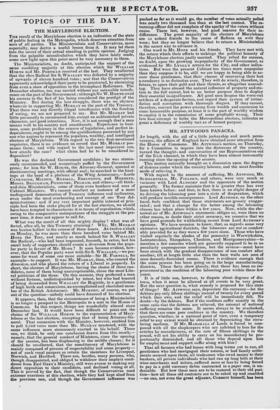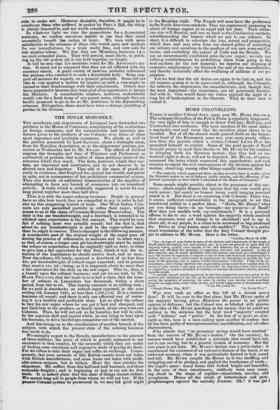MR. ATTWOODS PANACEA.
AT length, with the aid of a little jockeyship and much perse- verance, the affairs of England have obtained some attention from the House of Commons. Mr. Arrwooe's motion, on Thursday, for a Committee to inquire into the distresses of the country, turned the thoughts and conversation of our Representatives out of the Irish channel, in which they have been almost incessantly running since the opening of the session.
This motion naturally brought on a discussion upon the degree of distress under which the country labours, and the most feasible mode of relieving it.
With regard to the amount of suffering, Mr. ATTWOOD, Mr. SCHOLEFIELD, Mr. FIELDEN, and others, were very much at
variance with Lord ALTHORP and the opponents of the motion generally. The former maintain that it is greater than has ever been known before; and that, in fact, there is no slight danger of
its driving the labouring poor into a state of desperation, which will produce terrible consequences. Lord ALTHORP, on the other
hand, feels confident that these statements are grossly exagge- rated ; and that a change for the better among the labouring classes has taken place within a few years. Now, while the rhe-
torical air of Mr. Arrwoon's statements obliges us, were there no ether reason, to doubt their strict accuracy, we conceive that we have good grounds for withholding assent from Lord ALTHORP'S opinions. We have occasion to know, that, as regards some very extensive agricultural districts, the labourers are not so comfort- ably provided for as they were a few years since. Those who have
visited regularly the abodes of the peasantry in Warwickshire, Leicestershire, Shropshire, Cheshire, and Montgomeryshire—to mention a few counties which are generally supposed to be in no peculiarly unprosperous condition, but the reverse—must have been struck with the gradual disappearance of one comfort after another, till at length little else than the bare walls are seen of
once decently-furnished rooms. There is evidence enough that the same process has been going on in the large manufacturing districts. These facts show plainly, that there has been no im- provement in the condition of the labouring poor within these few years.
It is of little use, however, to dispute about degrees of dis- tress, when it must be allowed at all events to be very great. But the next question is, what remedy is proposed for this state
of things? Mr. Arrw000 says, depreciate the currency—let the debtors pay only fifteen shillings instead of twenty for every pound
which they owe, and the relief will be immediately felt. No
doubt—by the debtors. But if the creditors suffer exactly in the same ratio that the debtors are relieved, the amount of national suffering remains the same. It seems always to be overlooked,
that there are some poor creditors in the country. We therefore question, whether, in a national point of view, even a temporary relief to any extent would be obtained by depreciating the circu-
lating medium. If Mr. MARSHALL of Leeds is forced to com- pound with all the shopkeepers who are indebted to him for the articles he manufactures, at the rate of fifteen shillings in the pound, will not his ability to carry on his manufactory be pro- portionally diminished, and all those who depend upon him for employment and support suffer along with him?
That all farmers who had leases with long terms yet to run, all gentlemen who had mortgaged their estates, or had family settle- ments secured upon them, all tradesmen who owed money to their bankers, all private individuals who had run up long bills at their wine-merchants and tailors, suffered more or less by being forced to pay in a gold currency debts contracted in a paper one, is un- deniable. But how these men are to be restored to their old posi- tion—how all these old contracts are to be raked up and resettled —no one, not even the great adjuster, Colmar himself, has been able to make Wet. However desirable, therefore, it might be to reimburse these who. suffered in pocket by Peee's -.Bill; the thing is plainly impossible, and not worth consideration., In whatever light we view the propositions for a depreciated currency, we confess ourselves unable to see that they could essentially benefit the nation at large. We turn with more Satisfaction to the schemes of those who would open new markets for our manufactures by a trade really free, and new soils for entr surplus labour, We fear that our Ministers, however, Lave no such extended plans. They will persist, most likely, in patch- ing up the old system till it can hold together no longer. It will be seen. that 138 members voted for Mr. ATTWOOD'S mo- tion. It must not be supposed that they are all afflicted with the currency mania. A great variety of motives probably influenced the persons whceswielled it to such a formidable body. Some sup- port all motions '.fbr inquiry, on a general principle. Some did not like to vote 'against a motion for inquiry, as such a vote might be turned to their disadvantage with their constituents. Others may have supported it because they were glad of an opportunity to harass the Ministry. A considerable number, however, undoubtedly would vote for a fresh issue of one-pound notes, although they are hardly -prepared to go as far as Mr. Arrw000 in his depreciating schemes. Alttogether, there must have been a strange jumbling of parties in the division.





















 Previous page
Previous page